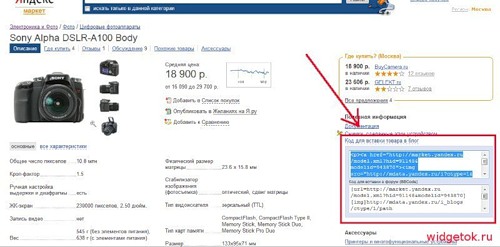Widgets for online stores
One type of site where web widgets can be especially useful is online shopping. Using widgets you can
How? I will share a couple of ideas.
Immediately I will warn that all of the above will apply to shops that work with consumer goods. If the company sells power generators for drilling rigs or mineral fertilizers, it is unlikely that widgets will help here. But if the household, photo and video equipment, books or even computer games, it is worth thinking about this topic.
The simplest thing is to make a widget to insert into the blog with information about the product. I don’t understand why nobody does this: Yandex.Market has already had such a function for a year, and has never seen it in online stores. From a technical point of view, this is quite simple to implement, no further support is required, and it can bring a lot of benefits.
What does this look like? Just a button on the product description page: “Insertion code in the blog”, and when you click on it, a text field appears with a code that the user can copy to himself. The code contains a link to the product image, model name, store name and a link to the description page.

')
For example, a person comes to the store site and sees the camera of his dream. He will buy it or not buy it - a separate question. But in any case he wants to share his impressions with friends.
He sees the embed code and copies it into his blog entry.

Thus, the store receives:
And now even those visitors who do not buy anything can benefit the store by advertising it.
The method is more complicated - to make a wish list on the basis of the store (wish list).
The user selects from the directory that he would like to have, adds to the list, receives the code for insertion and puts it on the blog. Or simply gives a link to the wishlist to friends (for example, before the birthday). After that, other people already buy these goods as a gift to the birthday man, and in this way, one person brings several customers to the store at once.
Another option is an affiliate program on widgets . As a rule, the store - the owner of the affiliate program either provides his or her list of goods so that the partners open their stores, or banners and affiliate links. But you can also give widgets for each product, similar to the code for insertion into the blog.
Finally, integration with social networks . There are really great opportunities here, because every user of a social network is not an anonymous visitor, but a person about whom we can find out something: what is he interested in, who is friends with, what are his friends interested in, how old are he, etc. And based on this, the online store can already find an individual approach to it.
For example, you can give personal recommendations in choosing a product: on the website of a bookstore the user enters his nickname LiveJournal, the system makes a request to the social network, gets a list of his interests. And if he is interested in psychology, offers a choice of new items from the section "Psychology", and if gladioli, from the section "Gardening". Of course, offering for the results is also the code to insert into the blog, so that the news about the service spreads further: as practice shows, when properly started, the attendance of the service for the social network can easily reach several thousand people per day.
Of the projects that really work on this principle, I know two.
1) Shop Script contains product widgets and baskets that can be embedded on pages. As far as I understand, after the “file completion” these widgets can be used to create an affiliate program.
2) The designer of online stores from PrivatBank: agentnano.com . It allows you to create your own small online store that fits in the flash-widget and place it on any website. Moreover, the order is also directly in the widget. Statistics on the project page states that 973 such nano-shops have already been created, but many of them sell 1-2 goods.
If anyone knows more examples, please share in the comments.
Do you think that such approaches will justify themselves at all, or will they stumble upon some “pitfalls”?
- keep in touch with customers
- to make shoppers advertise the store
- to organize affiliate programs
- create new sales channels
- to conduct advertising campaigns in social networks
How? I will share a couple of ideas.
Immediately I will warn that all of the above will apply to shops that work with consumer goods. If the company sells power generators for drilling rigs or mineral fertilizers, it is unlikely that widgets will help here. But if the household, photo and video equipment, books or even computer games, it is worth thinking about this topic.
The simplest thing is to make a widget to insert into the blog with information about the product. I don’t understand why nobody does this: Yandex.Market has already had such a function for a year, and has never seen it in online stores. From a technical point of view, this is quite simple to implement, no further support is required, and it can bring a lot of benefits.
What does this look like? Just a button on the product description page: “Insertion code in the blog”, and when you click on it, a text field appears with a code that the user can copy to himself. The code contains a link to the product image, model name, store name and a link to the description page.

')
For example, a person comes to the store site and sees the camera of his dream. He will buy it or not buy it - a separate question. But in any case he wants to share his impressions with friends.
He sees the embed code and copies it into his blog entry.

Thus, the store receives:
- free ad for "word of mouth"
- link to your website for SEO
- A new "chip" for users, which is not the competitors.
And now even those visitors who do not buy anything can benefit the store by advertising it.
The method is more complicated - to make a wish list on the basis of the store (wish list).
The user selects from the directory that he would like to have, adds to the list, receives the code for insertion and puts it on the blog. Or simply gives a link to the wishlist to friends (for example, before the birthday). After that, other people already buy these goods as a gift to the birthday man, and in this way, one person brings several customers to the store at once.
Another option is an affiliate program on widgets . As a rule, the store - the owner of the affiliate program either provides his or her list of goods so that the partners open their stores, or banners and affiliate links. But you can also give widgets for each product, similar to the code for insertion into the blog.
Finally, integration with social networks . There are really great opportunities here, because every user of a social network is not an anonymous visitor, but a person about whom we can find out something: what is he interested in, who is friends with, what are his friends interested in, how old are he, etc. And based on this, the online store can already find an individual approach to it.
For example, you can give personal recommendations in choosing a product: on the website of a bookstore the user enters his nickname LiveJournal, the system makes a request to the social network, gets a list of his interests. And if he is interested in psychology, offers a choice of new items from the section "Psychology", and if gladioli, from the section "Gardening". Of course, offering for the results is also the code to insert into the blog, so that the news about the service spreads further: as practice shows, when properly started, the attendance of the service for the social network can easily reach several thousand people per day.
Of the projects that really work on this principle, I know two.
1) Shop Script contains product widgets and baskets that can be embedded on pages. As far as I understand, after the “file completion” these widgets can be used to create an affiliate program.
2) The designer of online stores from PrivatBank: agentnano.com . It allows you to create your own small online store that fits in the flash-widget and place it on any website. Moreover, the order is also directly in the widget. Statistics on the project page states that 973 such nano-shops have already been created, but many of them sell 1-2 goods.
If anyone knows more examples, please share in the comments.
Do you think that such approaches will justify themselves at all, or will they stumble upon some “pitfalls”?
Source: https://habr.com/ru/post/55441/
All Articles